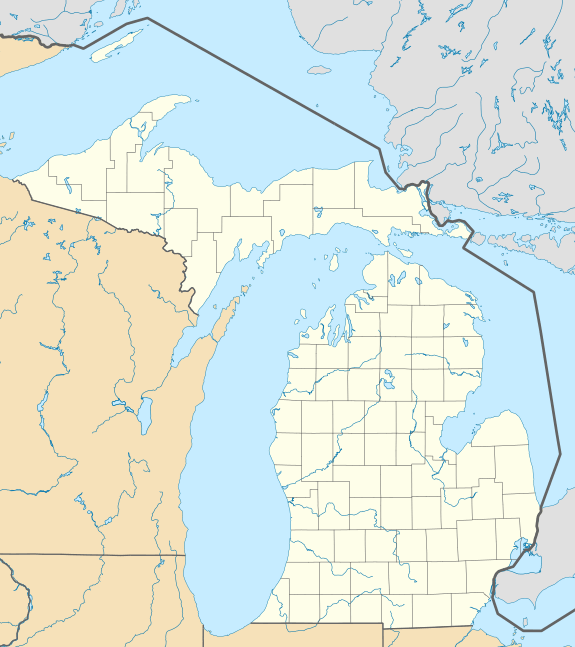Bay de Noquet Lumber Company Waste Burner
|
Bay de Noquet Lumber Company Waste Burner | |
|
Waste burner c. 1978 | |
  | |
| Location | South end of River St., Nahma Township, Michigan |
|---|---|
| Coordinates | 45°50′7″N 86°39′35″W / 45.83528°N 86.65972°WCoordinates: 45°50′7″N 86°39′35″W / 45.83528°N 86.65972°W |
| Built | c. 1888 - 1893 |
| NRHP Reference # | 11000177[1] |
| Added to NRHP | April 8, 2011 |
The Bay de Noquet Lumber Company Waste Burner is an industrial waste burner located at the south end of River Street in Nahma Township, Michigan. It was built to burn waste wood and bark from the nearby sawmill; it is the only known example of this type of waste burner surviving in Michigan,[2] and it was listed on the National Register of Historic Places in 2011.[1]
History
In 1881, George Farnsworth and his partners in Wisconsin's Oconto Lumber Company[2] founded the Bay de Noquet (later Bay de Noc[3]) Lumber Company.[4] The company immediately built a sawmill in Nahma, along the northern coast of Lake Michigan, opening it in 1882.[2] Fires were problematic, and the Nahma sawmill was destroyed by fire in 1889 and again in 1899.[4] In response, the company built this wastewood burner, located on a small nearby island, to eliminate the sawmill waste.[4] Although the exact construction date is not known, it was some time between 1888 and 1893;[2] it is not unlikely that the burner was built after the 1889 fire.[4]
The sawmill was destroyed yet again in 1923.[2] The company rebuilt, and continued to log the surrounding area[3] and use the waste burner.[2] However, available timber supplies were dwindling, and the mill shut down permanently in 1951.[2]
Description
The Bay de Noquet Lumber Company Waste Burner is a round tower, 32 feet (9.8 m) in diameter on the outside and approximately 100 feet (30 m) tall.[2] It is constructed of cast iron plates lined with brick, and sits on a 6 feet (1.8 m) high limestone foundation.[2] The exterior iron plates are rectangular, and are placed in horizontal rows with a slight overlap between adjacent plates.[2] The lowest five rows have an additional strap to prevent the structure from bulging outward.[2] The lowest row contains arched openings penetrating into the interior of the burner, apparently used to remove ashes.[2] A larger opening about halfway up the structure was originally used to dump waste via a conveyor into the burner.[2] A wire mesh dome, put in place to prevent embers from escaping, covers the top, and a weathervane inscribed with "B. de N. Co." is in place at the very top.[4]
The interior brick is about 18 inches (460 mm) thick in the lower 30 feet (9.1 m) and about 8 inches (200 mm) thick in the next 24 feet (7.3 m).[2] Above that level the burner is unlined.[2] This construction is very similar to that found in the 1888 patent issued to Muskegon Boiler Works.[2]
The burner is located on low ground near Lake Michigan, in a position that was at one time about 60 feet (18 m) east of the sawmill proper.[2] However, all traces of the sawmill have been erased, save for wooden pilings along the shore and the waste burner itself.[2] A golf course now occupies the former site of the mill.[2]
References
- 1 2 "Weekly List of Actions Taken on Properties: 4/04/11 through 4/08/11". National Park Service. April 15, 2011. Retrieved April 5, 2012.
- 1 2 3 4 5 6 7 8 9 10 11 12 13 14 15 16 17 18 19 Robert O. Christensen (November 2010), National Register of Historic Places Registration Form: Bay de Noquet Lumber Company Waste Burner (PDF), MI SHPO
- 1 2 "Nahma Peninsula". Hunt's Guide to the Upper Peninsula. Archived from the original on April 19, 2012. Retrieved April 19, 2012.
- 1 2 3 4 5 Diane B. Abbott; Historic American Engineering Record; Charles K. Hyde (1978), The Upper peninsula of Michigan: an inventory of historic engineering and industrial sites, Historic American Engineering Record, Office of Archeology and Historic Preservation, Heritage Conservation and Recreation Service, U.S. Dept. of the Interior, p. 49